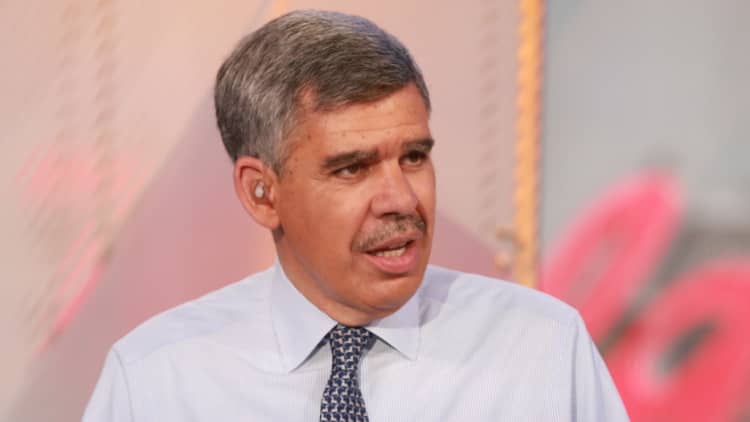
The Federal Reserve is likely to hold interest rates steady for the entire year after hiking four times in 2018, predicted economist Mohamed El-Erian.
The chief economic advisor at Allianz and former Pimco chief told CNBC on Tuesday that he sees a 50 to 55 percent chance of the next Fed move being a cut that would happen sometime in 2020. In December, the Fed projected two rate increases this year. But few in the market still expect that path.
And another tool to tighten-up monetary policy, the unwinding of the Fed's balance sheet, or portfolio of assets, "certainly will go off autopilot" in 2019, El-Erian said on "Squawk Box."
The central bank is aiming to reduce its more than $4 trillion worth of bond holdings by up to $600 billion this year by not replacing maturing assets.
El-Erian thinks that balance sheet plan will be changed. "It will alter both the notion of the destination and the pace." He refused to the put numbers on the destination, saying its data dependent.
On the matter of Fed Chairman Jerome Powell having dinner Monday evening with President Donald Trump, El-Erian said, "It was really important that this happened this week, and not last week" before the central bank's January policy meeting. "Had it happened before the pivot, we would be having a completely different conversation," he added.
El-Erian said that Fed chiefs meeting with presidents is normal and has happened plenty of times before. For example, Trump met with Powell's predecessor, Janet Yellen, in October 2017. When Barack Obama was in the White House, he met with Yellen in April 2016 and November 2014.
Trump, who nominated Powell to be Fed chairman, has been one of Powell's biggest and most vocal critics, blaming central bank rate increases for slowing the economy and roiling the stock market.
"I always feel it's important for two sides to hear each other and it reduces, but it doesn't eliminate, but reduces misunderstandings in the future," El-Erian. "I think net-net this is neutral to slightly favorable to the market. But it's not a big deal."
Meanwhile, El-Erian gives Powell a grade of "A," saying anyone would have had troubling navigating the current economic and market conditions. Though he did call Powell's early October signal of four rate hikes for 2019 a mistake.
Powell did walk back those comments but the stock market plunged in the final three months of the year, hitting a closing low on Christmas Eve and touching a bear market decline of more than 20 percent from its record highs. Wall Street has staged a recovery since then, with January posting the best month of gains in stocks since October 2015.
El-Erian said Powell's proclamation after last week's Fed meeting of patience before any more rate moves reinforced the case to buy stocks — "expected return goes up, expected volatility goes down."
"It played on expectations that liquidity would be accommodated, if needed. And therefore, you can be more comfortable going back to the old view ... look at dips as perhaps buying opportunities," he added.


